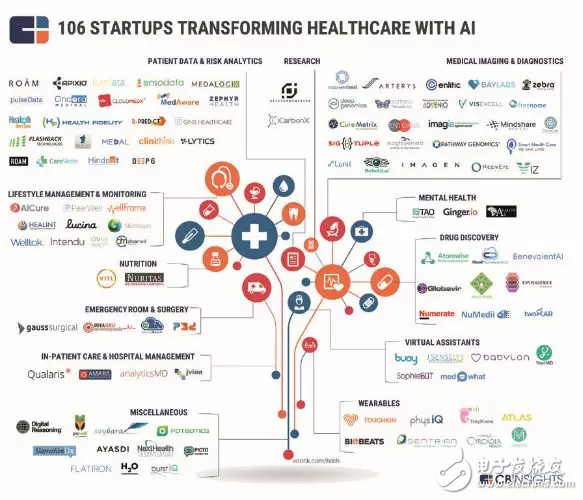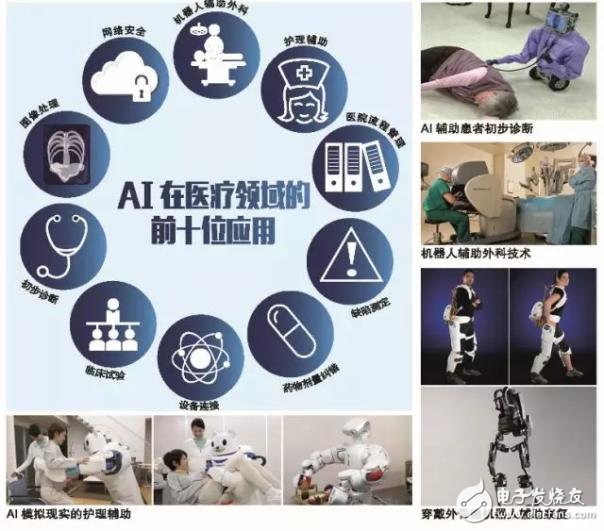Artificial intelligence (AI) is a new technical science that studies and develops theories, methods, technologies, and medical systems used to simulate, extend, and extend human intelligence. AI is a branch of computer science that seeks to understand the essence of intelligence and produces a new intelligent machine that can respond in a similar way to human intelligence. Research in the AI ​​field includes robots, language recognition, image recognition, natural language processing, and expert systems.
On April 28, the State Council issued the "Opinions on Promoting the Development of "Internet Plus Medical and Health Care," and improved the "Internet +" in seven areas including medical services, public health services, family doctor signing services, drug supply guarantees, and medical AI applications. Medical and health service system. The core is the medical and health data and Internet smart connections that have previously been scattered across all types of medical institutions to optimize the allocation of medical resources, innovate service models, improve service efficiency, reduce service costs, and meet the growing health care needs of the people. .
On May 8th, at the launching ceremony of the "Human Machine Contest" for the first time in the world on the diagnostic imaging of nervous system diseases, Professor Wang Yongjun, a specialist in neurology, deputy director of the National Center for Clinical Research of Neurological Diseases and executive dean of Beijing Tiantan Hospital, introduced The application of artificial intelligence in the medical field, especially the diseases of the nervous system. He said that the nervous system is a universally linked network and is most suitable for research on artificial intelligence. It is particularly optimistic about the application of artificial intelligence in the future to change the clinical decision-making of brain diseases and hospital management.
Artificial Intelligence Rapidly Develops in the Medical Field
Professor Wang Yongjun introduced that AI uses “deep learning†to build and simulate the neural network of the human brain to analyze and learn. It interprets data, such as images, sounds, and texts, by mimicking the mechanisms of the human brain, and continues to extend the functions of the human brain.
"AI is constantly changing our medical care," said Professor Wang Yongjun. Research shows that the market for AI in the medical and health fields will increase from 600 million in 2014 to 6.6 billion in 2021, an increase of 11 times, and it will grow at an explosive rate in the future.
Figure 1 Enterprises that use artificial intelligence to change health care models have mushroomed

AI can help achieve unmet medical needs. The use of AI to change medical methods has risen in all aspects (Figure 1).
Professor Wang Yongjun introduced that at present, the AI ​​has the largest proportion of applications in the medical field is robot-assisted surgical technology, followed by AI simulation of realistic nursing aids, and the third is hospital process management, followed by defect determination, drug dose correction, and device connection. , clinical trials, initial diagnosis, automated image processing, network security.
"In the future, nurses do not have to inject fluids to push medicines, bedside ultrasound no longer needs to push such a heavy machine, send food to patients without caregivers going back and forth, and operating rooms don't have to go back and forth for more than 10 minutes." The professor said that these will soon be resolved in the smart age, and AI will bring new changes to the hospital.

Study the wisdom of the human brain
Brain-like computing to solve encephalopathy
Professor Wang introduced that the damage of nerve cells is irreversible, and the lethal disability rate is high. Early detection, early diagnosis, and early intervention are the keys to affecting the efficacy of neurological diseases. Under the background of the extremely uneven distribution of high-quality medical resources in China, the misdiagnosis rate and missed diagnosis rate in the primary clinical are high for the neurological diseases with high complexity and difficulty in locating diagnosis.
Professor Wang believes that the "human brain" diagnosis and treatment of neurological diseases is at the internationally leading Temple of Heaven hospital, and it has an inherent advantage and a big data foundation in AI research and development and in-depth learning. On December 22, 2017, the National Center for Clinical Research in Neurological Diseases initiated the establishment of the world's first Artificial Intelligence Research Center for Neurological Diseases and settled in Beijing Tiantan Hospital, a subsidiary of the Capital Medical University.
The application of AI in cerebrovascular disease is to study the wisdom of the human brain and solve brain diseases in a brain-like way. At present, the research direction of AI in the diagnosis and treatment of cerebrovascular disease mainly includes three aspects. In accordance with this, Tiantan Hospital participated in the development of the world's first CT, MRI neuroimaging AI-assisted diagnostic products.
Prediction of Hematoma Enlargement in Hemorrhagic Stroke
Professor Wang introduced that the mortality rate of intracranial hemorrhage is the highest among cerebrovascular diseases. The biggest reason is the expansion of hematoma, which can lead to several times increase in patient mortality. Hematoma enlargement can be prevented by lowering blood pressure and early use of hemostatic drugs. But not every patient will have a hematoma enlargement, and there is a risk of peripheral ischemia in lowering blood pressure. Hemostatic drugs can cause thrombosis and other risks. Therefore, accurate prediction of patients with enlarged hematoma and timely intervention is an important measure to reduce mortality in patients with cerebral hemorrhage. The current method is the injection of iodine contrast agent, the best positive predictive rate is about 70%. The AI ​​through the deep learning of massive disease information, hematoma expansion positive predictive rate or up to 85% to 90%; and AI do not have to inject contrast agents to patients, reduce potential kidney damage or for iodine allergy can not tolerate.
Ssd Mining,Ssd Memory,Ssd Memory Card,Cryptocurrency Ssd
Easy Electronic Technology Co.,Ltd , https://www.yxpcelectronicgroups.com
